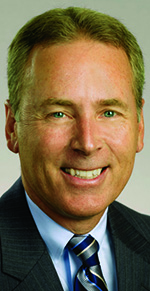Mark Shobe, president and CEO of Dearborn-based DFCU Financial, spoke with DBusiness Daily News about the institution’s growth plans and the standing of credit unions in Michigan.
1. DDN: DFCU was established in 1950. How has the business changed since then?
MS: In the early days, credit unions were very simplistic financial institutions. People used to say it was fine to (have) your checking account (there), but didn’t (deposit) any real money there. But today, credit unions offer all the same products and services that the banks do.
In the last 10 years, we’ve gone from six locations in Dearborn and Livonia to nine in southeastern Michigan. We also completed two business acquisitions in 2009 and 2010 that expanded our geographic footprint to Ann Arbor, Lansing, and Grand Rapids as well. We now have 24 offices that span the state.
2. DDN: What do you attribute this growth to?
MS: It’s a combination of many factors. One is we have a loyal client base. We also pay a huge cash-back dividend. What we do is we take your average savings balances and your average borrowing balances for the year, and then we pay you a half percent back on those at the end of the year.
Of the $23 million that we just paid in January, $17.5 million, or 76 percent, went to Tri-county clients in Macomb, Oakland, and Wayne. So three quarters of those monies went right back into the tri-county economy. We try to think of it as our own little economic stimulus program.
Over the last eight years, we’ve paid out $157 million to our client base. The average amount that our clients receive is $250. The largest (this year) was $18,000.
3. DDN: Why did you decide to offer your cash-back program?
MS: The way we look at it is we need a certain amount of capital reserves to meet regulatory requirements and a certain amount of reserves to invest in new initiatives — buying companies, opening branches, that sort of thing. Everything else is just residual capital, so we return it back to our clients, our members as we call them. We pay out about a half of our earnings to our client base every year.
4. DDN: Do you foresee more people joining credit unions over banks in the future?
MS: Most people don’t think of there being a difference (between a credit union and a bank). People refer to our credit union as their bank. The real difference is the legal structure. We are a financial cooperative, so we don’t have third party shareholders. Most or many of the banks are stock institutions, so they have third party shareholders that they deal with.
In days gone by, the thing the big banks, the multinational banks, sold was convenience — a branch on every corner and thousands of ATMs. In today’s digital world, with mobile banking, you can deposit a check using your phone. A lot of that advantage the big guys had is gone, so credit unions and community banks, which offer the value proposition of high touch service, are great options for most consumers to consider.
5. DDN: What does the future hold for DFCU Financial?
DDN: We’d like to fortify our footprint in the markets that we’re already in: Grand Rapids, Lansing, Ann Arbor, and metropolitan Detroit. There’s adequate business for us, we just need to continue to (draw) more local consumers. Most households have multiple banking relationships, and if we can get people to choose us as their primary financial institution, then we’re going to have a much broader relationship with them.






